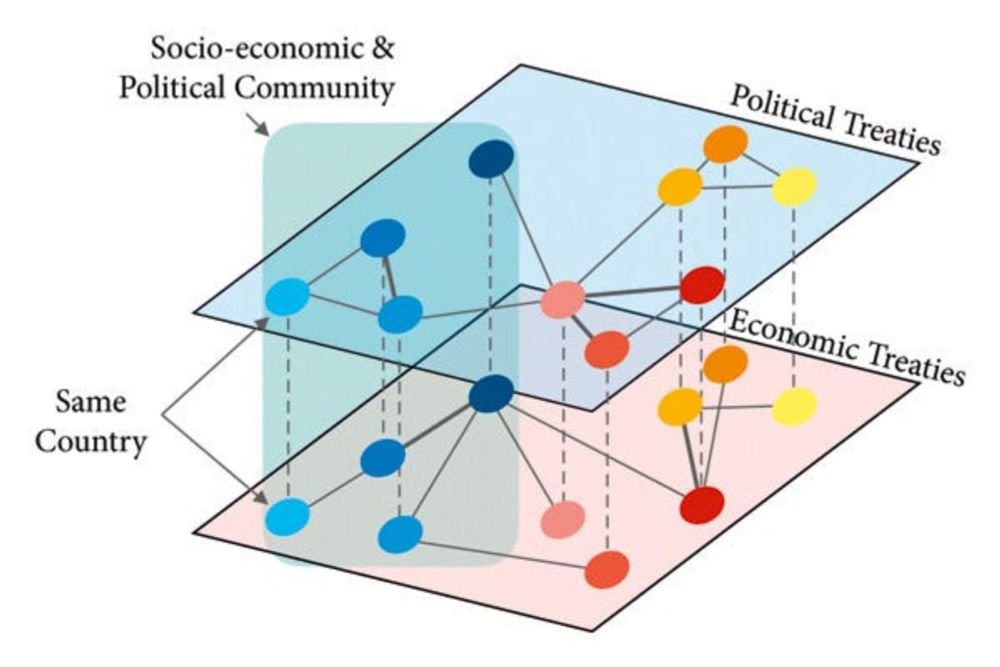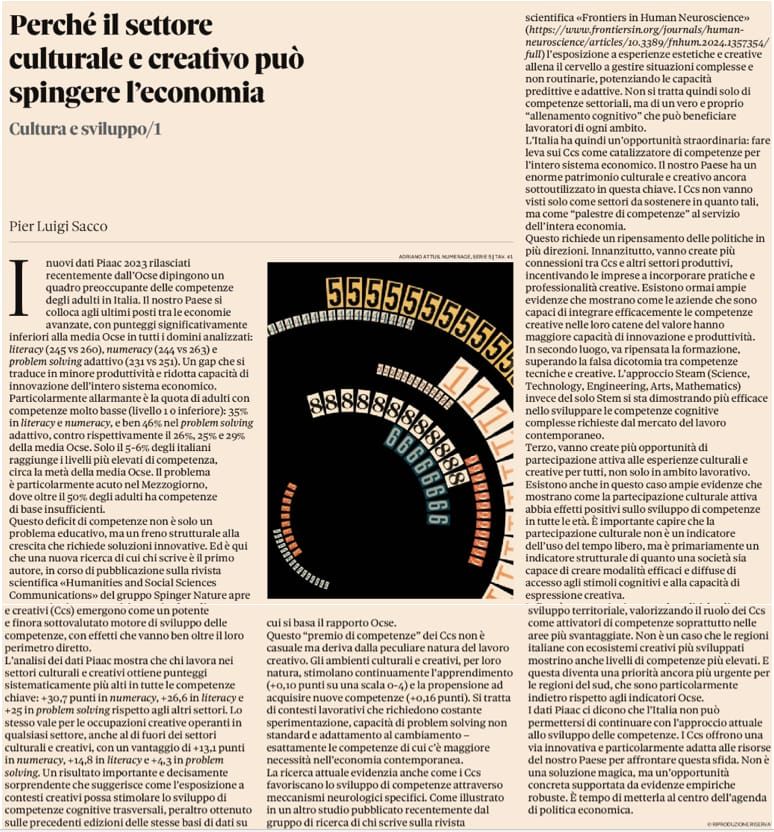Reposted by: Pier Luigi Sacco
As we enter an era marked by multipolar power dynamics, shifting alliances and institutional stress, the possibility of sudden breakdowns in global governance becomes real.
New #ComplexityThoughts: open.substack.com/pub/manlius/...
🎧 creators.spotify.com/pod/show/com...
New #ComplexityThoughts: open.substack.com/pub/manlius/...
🎧 creators.spotify.com/pod/show/com...

Fragile balances: understanding global stability
Predicting the fate of world order using a toy model
open.substack.com
To what extent game design and gaming experiences help us understand, and get prepared to, major events like a pandemic, a war, or a sudden deep reshuffling of the global world order? If you are interested in this fascinating and, I would say, very relevant topic, have a look!

The last issue of the Venice Biennale magazine, which is eloquently titled 'Anteguerra' ('Prodromes of war') also features a conversation of mine with Matt Leacock, one of today's most brilliant and imaginative game designers.

Turns out Trump is the best possible testimonial for liberal electoral tickets worldwide 🇨🇦🇦🇺
What is happening is too complex and unpredictable to be addressed via traditional approaches. One of the unexpected consequences of the chaos is paving the way to a new science of international relations. Here's to it!
There are also a few remarks by yours truly that comments on what the model succeeds in getting and what else is missing. I think this is a moment where computationally-based models of international relations may carry an especially high value, where traditional qualitative analyses fail
It presents a paper of ours where we somewhat presciently analyzed some scenarios that have something to say about the current chaos, and a simple but insightful dynamical model that captures some basic facts.
The Complexity Thoughts blog by @manlius.bsky.social is always a no-brainer read (NB: but it needs brains!) for anyone interested in complexity sciences. This time with an extra perk: it's about how to model the dynamics of world order.
Ha fatto di male che non permette ai super privilegiati di abusare abbastanza della loro posizione. Un po' sì ma è troppo poco. E quindi ora si stanno attrezzando
Reposted by: Pier Luigi Sacco, Heidi Altman, Elizabeth Sauer
TOMORROW- Friday, February 28th is BLACKOUT FRIDAY!
If you believe we are in danger of losing our Democracy forever, FIGHT BACK!
Let's make our voices heard in numbers too big to ignore.
JOIN US if you've had it with Comrade Krasnov. 🤬 🇷🇺
#24HourEconomicBlackout
If you believe we are in danger of losing our Democracy forever, FIGHT BACK!
Let's make our voices heard in numbers too big to ignore.
JOIN US if you've had it with Comrade Krasnov. 🤬 🇷🇺
#24HourEconomicBlackout

You can find the study on the neurocognitive foundations of cultural experiences here: www.frontiersin.org/.../fnhum.20....
The other one will be available as soon as it's published. Stay tuned! 12/12 🧪
The other one will be available as soon as it's published. Stay tuned! 12/12 🧪
www.frontiersin.org
Culture is therefore not just leisure or entertainment, but a true "cognitive training" that enhances fundamental capabilities for innovation and growth. It's time to recognize this strategic role in skills development policies. 11/12 🧪
This is no coincidence: these work environments constantly stimulate our predictive system, training it to be more flexible and adaptable. 10/12 🧪
This mechanism perfectly explains why, as shown by the PIAAC data I presented yesterday, those who work in cultural and creative sectors show significantly higher levels in all key competencies: numeracy, literacy, and problem solving. 9/12 🧪
These 'experiences' are so important to us that not only do we identify with characters as if they were real people, but when a story grips us, we are capable to stop doing everything else until we know how it ends. 8/12 🧪
Think of stories, which are a laboratory of social cognition where, as Umberto Eco said in a famous op-ed, we can live thousands of lives parallel to our own, learning fundamental things from these 'experiences' about our ability to exist in the world and especially to understand others. 7/12 🧪
Cultural and creative experiences allow us to train this predictive capacity in a "protected" environment, where prediction errors have no negative practical consequences. 6/12 🧪
... the brain as a predictive machine that continuously seeks to anticipate future situations across many different time scales to enable optimal regulation of our biological functions and our ability to respond effectively to environmental conditions and challenges. 5/12 🧪
In a new study published in Frontiers in Human Neuroscience, we propose a neuroscientific explanation of how the human brain processes cultural experiences. The key lies in "predictive coding": 4/12 🧪
Today, in addition to sharing the complete text from yesterday's piece, I would like to better explain why these results are so important and how they connect to an even more fundamental discovery about the very nature of cultural experience. 3/12 🧪

Yesterday I shared in the Il Sole 24 Ore newspaper some surprising results about skill levels in cultural and creative sectors that emerge from a forthcoming paper written with Piotr Bialowolski and Dorota Weziak-Bialowolska. 2/12 🧪
Why arts and culture are so important for humans (and for the economy) -- no, it's not the reason you think! A 🧵 🧪 1/12
L'altra ricerca, collegata a questa, ha implicazioni più fondazionali, ma ne parlerò in un post a parte.
Domani posterò iil testo completo dell'articolo.
#Competenze #Innovazione #Cultura #piaac2023
🧵 9/9
Domani posterò iil testo completo dell'articolo.
#Competenze #Innovazione #Cultura #piaac2023
🧵 9/9
Per l'Italia, con il suo ricco patrimonio culturale, questo rappresenta un'opportunità concreta: utilizzare i CCS come "palestre di competenze" per l'intero sistema economico, attraverso maggiori connessioni intersettoriali, formazione STEAM e partecipazione culturale attiva diffusa.
🧵 8/9
🧵 8/9
Gli ambienti CCS favoriscono infatti l'apprendimento continuo e la capacità di gestire situazioni complesse non routinarie.
🧵 7/9
🧵 7/9
Il vantaggio si estende anche alle occupazioni creative in settori non culturali, suggerendo che l'esposizione a contesti creativi stimola lo sviluppo di competenze cognitive trasversali.
🧵 6/9
🧵 6/9
i settori culturali e creativi (CCS) emergono come catalizzatori di competenze trasversali. I lavoratori in questi settori mostrano punteggi sistematicamente più alti in tutte le competenze chiave: +30,7 punti in numeracy, +26,6 in literacy e +25 in problem solving.
🧵 5/9
🧵 5/9
In un paper scritto con Piotr Bialowolski e Dorota Weziak-Bialowolska in corso di pubblicazione su Hummanities and Social Sciences Communications, la rivista di settore del gruppo Springer-Nature, abbiamo però identificato un'opportunità strategica:
🧵 4/9
🧵 4/9
